"Love is so much more powerful than hate. Hate is destruction and love is production."
Lynval Golding
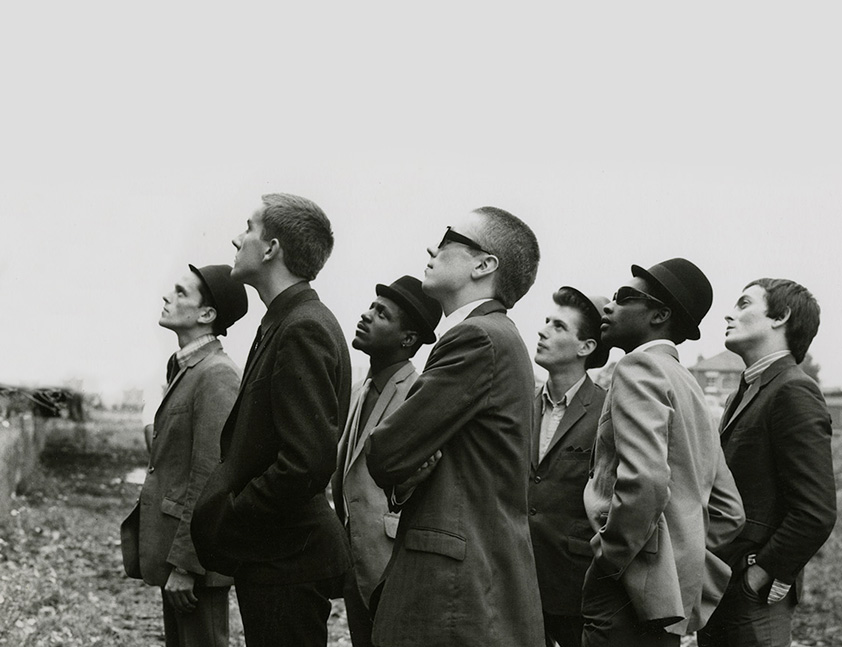
The Specials are back with ten songs on a brand new album. Influential, important and exhilarating live, they are a band embedded in this country's DNA. It is impossible to envisage the musical landscape without them, from the startling, angular Gangsters in 1979 to their swan song, the epoch-making Ghost Town in 1981. They infused ska with punk, homegrown political anxiety with wider issues. The Specials' ascendancy was swift. Two years, seven hit singles including two number ones, two hit albums, sell-out tours – the mass stage-invasions and audience energy only adding to the myth. They were everywhere; on Top of the Pops, Radio One, nightclubs and school discos. At the time, the nation could not have seemed more polarised: far right youth cults, violence on the streets, conservative government. Their demise, however, was rapid.
April 1981. The Specials spend ten days recording Ghost Town in an 8-track home studio in Leamington Spa. The song spends three weeks at number one in July 1981 culminating in a Top of The Pops appearance 9th July 1981. In the dressing room afterwards the band split. In retrospect, maybe a signifier of how weird those times were is the fact that they are introduced on screen by both Jimmy Savile, and a nervy Adam Ant.
This line up of the Specials would never go in the studio again. "We did More Specials, the second album," says Lynval. "And oh God, someone left the band every day, the band would fall apart, then the next day they would rejoin again."
In 2009, with Britain in another recession, the Specials reform to play live - without founding member Jerry Dammers who clashes with the others during initial rehearsals. Terry Hall, Lynval Golding, Horace Panter, John Bradbury, Neville Staple and Roddy "Radiation" Byers play a sell-out tour and the offers keep coming.
"There was never a long term plan," says Horace, the Special's extremely grounded, polite bassist. "But before we knew it, it was 2012. Then Neville quit, out of ill health, Roddy quit thank goodness, so four of us were left, all facing in the right direction, all in agreement.
"Towards the end of 2015 Lynval, Brad and I got together in a little rehearsal room and we recorded some demos on a handheld mic," continues Horace. "Then of course Brad dies [in December 2015, of a heart attack]. It took a year or so to pick ourselves back up again."
But eventually they do, and they record.
Ten songs – originals and some covers. Encore.
And it's fucking great – acknowledging the last forty years, taking what the Specials did and moving it forward. And you can dance to it. Produced by original members Terry Hall, Lynval Golding and Horace Panter – alongside long-time Specials keyboardist Nikolaj Torp Larsen.
"With the Specials first time round, it was very much Jerry's thing," adds Horace. "You play this, you play that. Whereas this time around, the whole process was really joyous. Nobody was out of their heads, nobody had another agenda – we all wanted to make this great record."
"Nikolaj is like the fourth member of the band," says Lynval, by nature an extremely enthusiastic person. "He is an amazing keyboard player, arranger, producer… he's a godsend. Working with him was a blessing, we couldn't have done it without him."
The irony of course is that forty years ago the Specials embodied the state of the nation – seven voices as one from a typically dispossessed UK town. Now, in 2018, we have had a conservative government in office, recession and "austerity" measures which have dealt a direct hit at the vulnerable. Much has become full circle. "Scary isn't it?" says Horace. "We don't have to preach at all – although I don't think we ever did anyway. The songs are relevant – but then I always say injustice is timeless."
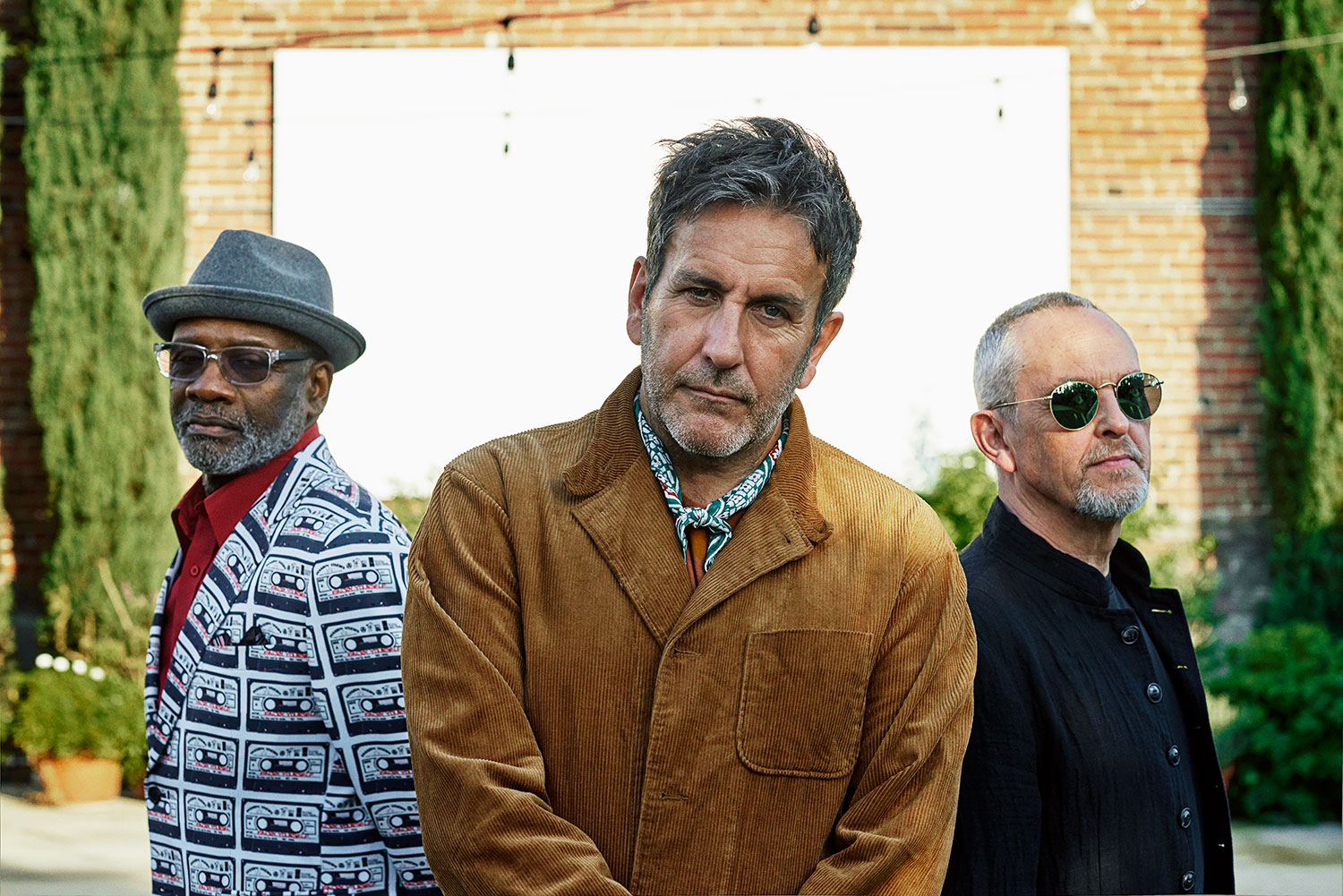
The genius of the Specials is that they are still observers, not commentators. The genius of the Specials is that they know what pop music is. The first track Black Skin Blue Eyed Boys – a cover of the Equals 1973 song - sounds like the Specials, but with '70s disco and funk thrown in. We start on an up.
"The Equals were the first British multiracial band," says singer Terry Hall, over a cup of coffee. "A lot of people think it's the Specials, and it's not so this is a tribute to them. People say to us, 'When we saw the Specials we saw that black and white is all right,' but me and Lynval thought that about the Equals."
Track two is Lynval's song. BLM (Black Lives Matter) is a sock to the jaw. From his father's arrival in the UK from Jamaica on the Windrush, to Lynval's own - arriving in Gloucester via Southampton in 1964. Systemic racism surrounds this song, taut like wire, as Lynval simply narrates his story.
"The signs keep saying the same thing/'No dogs, no Irish, no blacks'… Welcome to England."
"My father was from the generation who came to England on the Windrush to rebuild England after the Second World War," says Lynval. "That's the story we heard, usually late on a Friday night after my father came home from the pub. 'You don't know what I had to go through…' When he came to England at first he couldn't find anywhere to sleep – he had to sleep in a garage in Gloucester."
The song continues with Lynval's own experiences of being called a "black bastard" and a "goddam nigger". It's extremely powerful, and heartbreaking.
"Lynval is not saying it's right or wrong, there's no polemic, it's just his story," says Horace.
The genius of the Specials is that they don't do finger-wagging. "One thing we talked about before we started recording – how do we address these subjects that bug us?" says Terry. "We can't scream and shout about it anymore because we're a lot older – there'd be very little dignity left and it would be hypocritical too."
Vote for Me uses Jamaican rhythm and straight lyrics to nail essentially global, nameless corruption – with echoes of Ghost Town. "If you vote for me do you promise/To be upright, decent and honest/To have our best interests at heart?"
"It's about the idea of voting – can you be bothered? And if you are bothered, what are you voting for?" says Terry. "I can't get my head round Trump as an American president – or Theresa May dancing to Abba as everything crumbles around her. It's just nuts." The song is followed by a cover of the Fun Boy Three hit, The Lunatics Have Taken Over The Asylum.
"This was originally going to be the follow up to Ghost Town," says Lynval. "But because of the pressures and the eternal problems we had within the Specials we had to do it as Fun Boy Three. It was really great to revisit it. The intro is that wonderful keyboard by Nikolaj, which goes absolutely berserk at the end. It's classic Specials."
The clipped, percussive original of 1981 has been given more of a Latin treatment. It's wonderful. The lyrics still pull no punches decades later. "Go nuclear the cowboy told us/And who am I to disagree."
"That's how it feels and very little has changed," says Terry. "That was written in the Reagan era, where you think that world politics can't get any worse. But now it is worse… surreal worse."
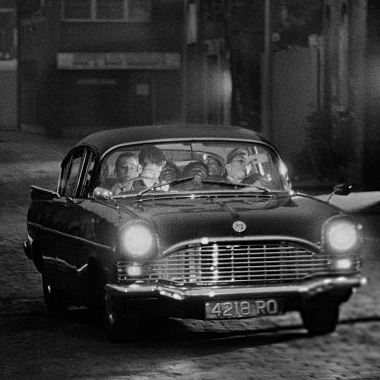
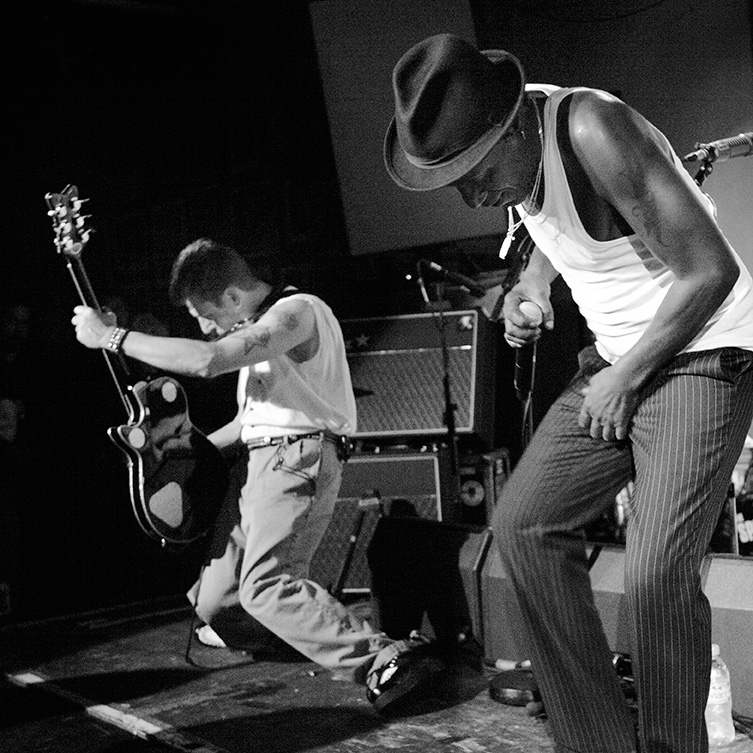
Breaking Point deals with the Internet, technology and social media – while the music is pure Weimar Germany, with a touch of Jacques Brel.
"That sort of music is what I listen to," says Terry. "Breaking point is how I feel every day. When I open my door I want to shut it again. I find it really hard to go out; you're playing zig zag with people on their phones. It's got to that stage now where our brains can't deal with technology anymore."
Blam Blam Fever by the Valentines, released in 1967 on Trojan, muses on gun culture.
"Horace brought this song in," says Terry. "We all thought we knew Trojan but we didn't know this." It suits the Specials perfectly.
"This fits in, especially in America," says Lynval, who now lives in Seattle. "People's attitudes are – if you don't have a gun how are you going to defend yourself? Something's wrong, you're not normal. Well, wait a minute – I think I'm normal because I don't want to shoot anyone."
The Ten Commandments is an answer song, a response to Prince Buster's Ten Commandments of Man (1965) which is essentially a list instructing a woman to be a supplicant to Prince Buster's ego. Now it's an all-out fuck-you, kick-ass glorious Ten Commandments addressing rape culture, misogyny, self-worth and alt-right "pseudo-intellectuals on the internet" with 20-year-old Saffiyah Khan. Saffiyah was photographed in 2017 squaring up to a member of the EDL, with the most incredible beatific smile on her face, at an anti-racist march in Birmingham. She was wearing a Specials t-shirt. The band saw the photo and got in touch.
Musically it up-ends Dawn Penn's No No No and transforms it into a paean for much that needs to change. Although it was the first time Saffiyah had been in a recording studio, it sounds like her second home.
"I found it difficult to write at first," says Saffiyah. "Then it all came together just before we went into the studio. I've never done music before and I didn't know what to expect, but they said 'Trust us, leave it with us,' and they mixed it really well."
"She was so shocked to be asked," says Lynval of Saffiyah. "But the way she puts it across – she's young, she has that energy. She's wonderful."
"They cover topics on that album with spoken word pieces," adds Saffiyah. "For this track we wanted to get something between Prince Buster, Sleaford Mods and The Fall - so I immersed myself in it… And of course mine is from a woman's point of view."
Embarrassed By You is co-written by Mark Adams, whom Lynval originally met while visiting Ernesford Grange school in Coventry.
"When we were known, on Top of the Pops and that sort of thing, I used to go round schools to talk to the kids about music," says Lynval. "I met Mark Adams when he was 12. I also met his parents and they said, 'He loves music!' so I said, 'Let him stick with me'. And he became a friend, we've worked together musically over the years [Mark Adams played keyboards with the band in the 90s]. He started it off and then Terry wrote rest of the lyrics. It's about being embarrassed by your peer group, robbing, stabbing… saying just sort yourself out."
Life and Times of a Man called Depression is almost a prequel to Breaking Point. A Terry song, spoken word, rather autobiographical.
"One thing I wanted to address was the ups and downs of my head, really," says Hall. "It's me looking back to when I first got properly diagnosed [with bipolar] 11 years ago, looking at that person and seeing how I've changed and how it's now mostly under control, whereas all those years ago it wasn't. It's important, if you've got a voice and people may listen to this, maybe they will understand it a bit more, how you feel – how it all feels, really."
The album ends with the glorious We Sell Hope. In recent years the live show encore was All the Time in the World, dedicated to drummer John Bradbury. This is similar and is bittersweet both musically and lyrically. "Looked all around the world, it'd be a beautiful place to live in."
"If you look at what the lyrics are saying," says Terry. "It's to be good to each other, because on a basic level, that's all you can do. Treat other people with respect and kindness."
The music is exquisite.
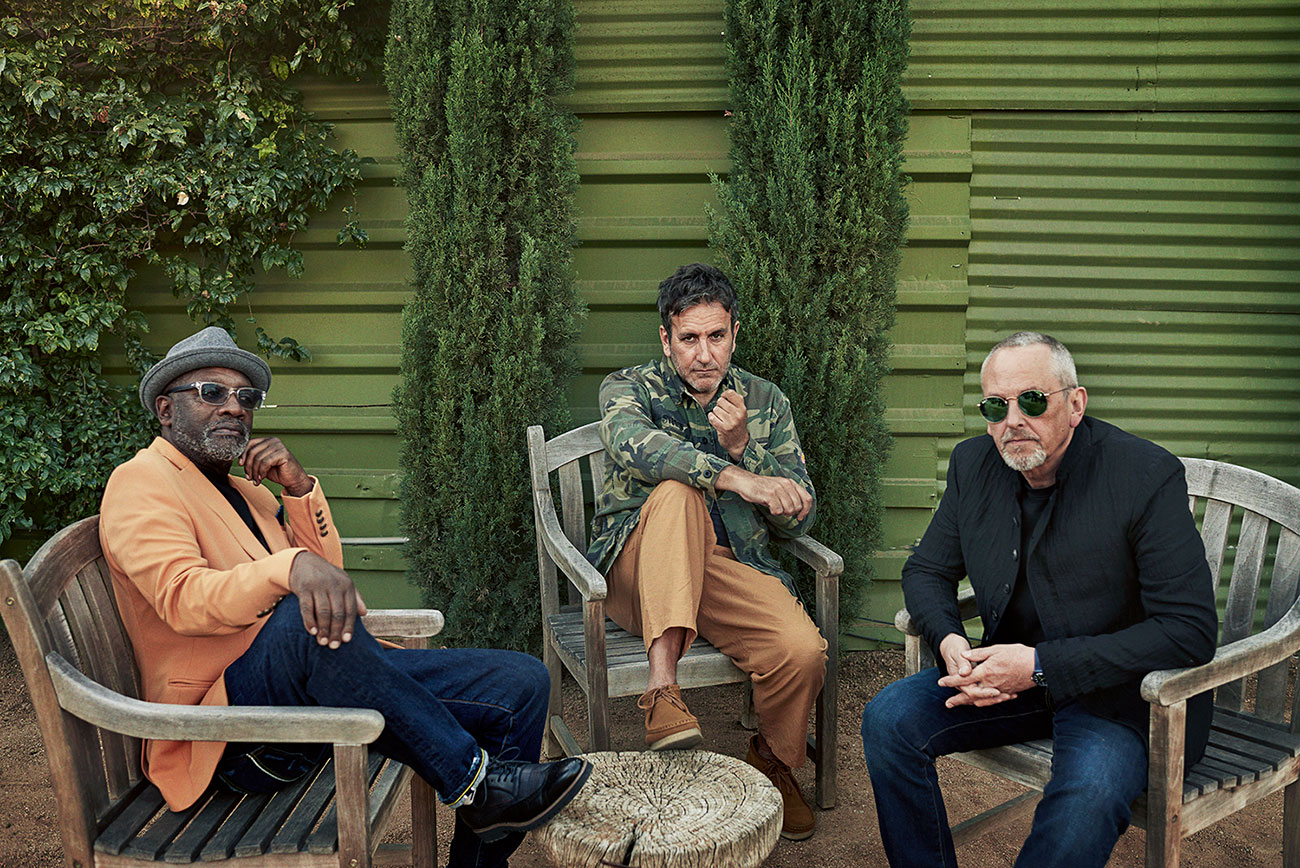
"We are very fortunate to have surrounded ourselves with excellent musicians," says Horace. "We're so lucky to have Steve Cradock on guitar, and also Kenrick Rowe on drums. They both make those songs sound fantastic – and Tim Smart, who plays trombone and has been with us since 2009. They're not just great songs, they're played by these amazing musicians."
The genius of the Specials is their innate understanding. The skill of re-contextualising what has gone before – from Monkey Man to Blam Blam Fever – and writing new songs that fuse this heritage with all that is current. Throughout the decades the Specials' influence has never gone away. And we need it.
"I'm aware our work has been out there for forty years and I'm so grateful for what we've done, I pinch myself sometimes," says Lynval. "I can pat myself on the back now, and say 'Well done,' because that what my father says to me. As a band, making this record, it was the closest we'd ever been."
"That's the thing with the Specials," says Horace. "We are three very different people, but you put us together and we become the greatest rock 'n' roll band in the world, as far as I'm concerned. Something remarkable happens."